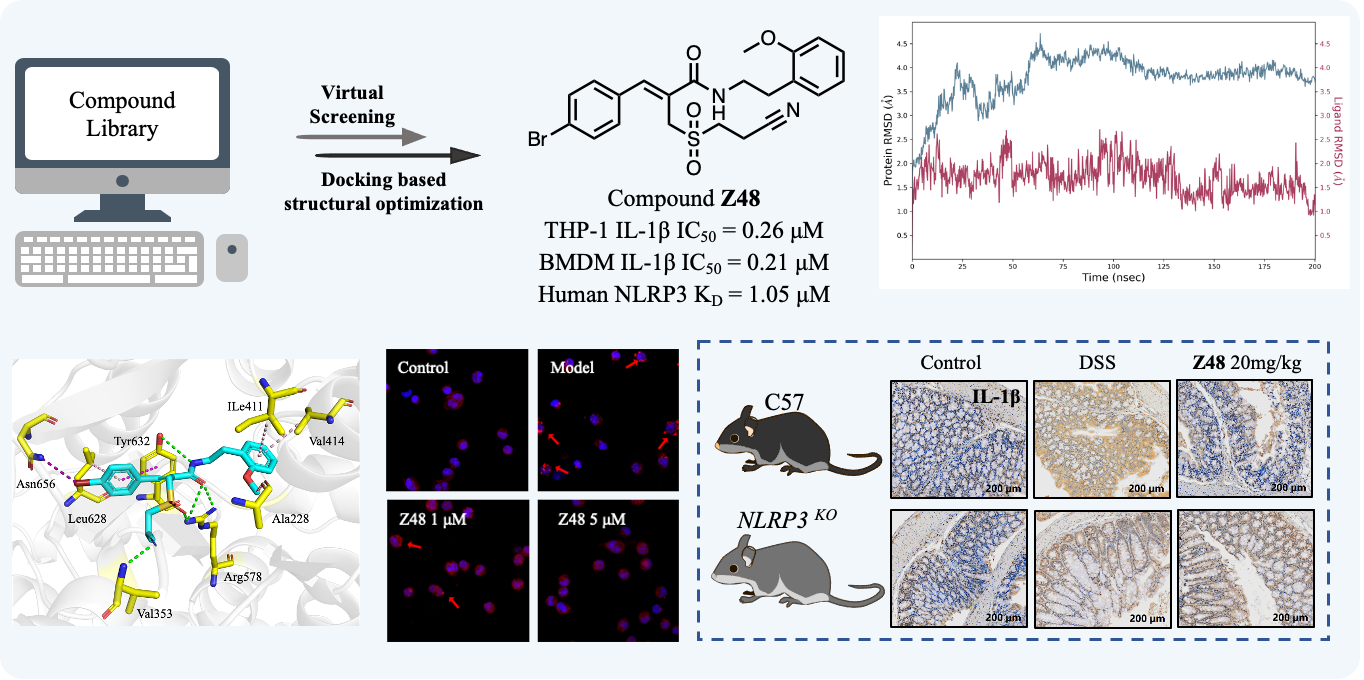
Recently, a study on “design, synthesis and bioevaluation of novel NLRP3 inhibitor with IBD immunotherapy from the virtual screen” has been published in the Journal of Medicinal Chemistry by Professor Xianfeng Gu's group from school of pharmacy,Fudan University. In this work, the research team used EBC-44274 obtained by computer virtual screening as the lead compound, and through multiple rounds of structure optimization, found a new NLRP3 inhibitor Z48 that can be used for the treatment of inflammatory bowel disease.

NLRP3 is an important member of the NLRP family and plays a key role in immune and inflammation regulation. The NLRP3 inflammasome is a multiprotein complex that plays a key role in the innate immune system in response to microbial infections and endogenous danger signals. The abnormal activation of NLRP3 inflammasome is associated with a range of inflammatory and autoimmune diseases, highlighting the importance of precise regulation of NLRP3 inflammasome to maintain immune homeostasis.
By using computer virtual screening technology, we screened about 260,000 compounds from commercial compound library and in-house compound library, and obtained 10 compounds with NLRP3 binding potential. Through screening experiments, we identified the lead compound EBC-44274 with good IL-1β inhibitory activity. Based on the molecular dynamics simulation and docking study, the mode of action of the lead compound and NLRP3 was clarified, and 54 derivatives were designed and synthesized. After evaluating the in vitro activity of these synthetic compounds, the preferred compound Z48 was found to be a novel NLRP3 inhibitor (0.26 μM in THP-1 cells and 0.21 μM in BMDMs). The results showed that Z48 directly interacted with NLRP3 protein (KD = 1.05 μM) and specifically inhibited the activation of NLRP3 inflammasome, but had no inhibitory effect on AIM2 and NLRC4. Notably, Z48 effectively inhibited nigericin, ATP, and MSU-induced IL-1β release, thus confirming its status as a broad-spectrum NLRP3 inflammasome inhibitor. Subsequent in vitro studies showed that Z48 effectively blocked ASC oligomerization and affected the protein-protein interaction of NLRP3-ASC and NLRP3-NEK7, thereby inhibiting the assembly of NLRP3 inflammasomes. The results of in vivo experiments showed that Z48 was effective in alleviating DSS-induced colitis and its activity was better than that of the positive control SASP. However, Z48 did not affect the severity of DSS-induced colitis in NLRP3KO mice, indicating that Z48 did exert its antigenic effect through the NLRP3 inflammasome. In conclusion, compound Z48 has the potential to treat chronic inflammatory diseases associated with NLRP3 inflammasomes and is expected to be a new therapeutic agent.

Ziwen Zhangand Hongyu Wu (Ph.D. students) from the School of Pharmacy, Fudan University are the co-first authors of the paper. Professor Xianfeng Gu and Associate Professor Wei Guo from the School of Pharmacy ,Fudan University are the corresponding authors of the paper. This work was supported by the National Natural Science Foundation of China and the Shanghai Municipal Science and Technology Commission.
Link to original article:https://doi.org/10.1021/acs.jmedchem.4c01445